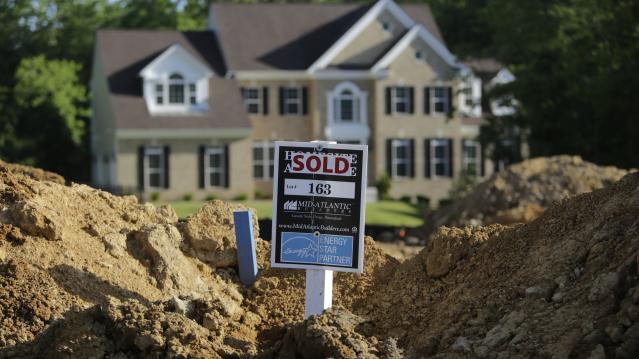How the Stock Market’s Wild Swings Have Helped Homebuyers

The rollercoaster week on Wall Street could pay off nicely for some homebuyers.
The sharp selloff in global markets, caused by the economic uncertainty in China, caused investors running for safety to buy up U.S. government bonds, driving interest rates down. That sent the rate on benchmark 30-year fixed-rate mortgages down to its lowest level since May.
Related: The Financial Mistake That Can Cost Homeowners
Mortgage giant Freddie Mac said Thursday that the average for 30-year fixed-rate loans fell to 3.84 percent, with an average 0.6 points, over the week ending August 27. That’s down from 3.93 percent last week and 4.10 percent a year ago. For 15-year fixed-rate loans, the average was 3.06 percent, down from 3.15 percent last week and 3.25 percent a year ago.
The average on 30-year fixed-rate mortgages has now been below 4 percent for five straight weeks. Just how long they stay there will be determined in part by when the Federal Reserve decides to raise interest rates for the first time since 2006. Many economists had expected the Fed to raise rates next month — but that was before the stock market’s latest shakeup.
"There are indications, though, that the unsettled state of global markets will make the Fed think twice before taking any action on short-term interest rates in September,” Sean Becketti, Freddie Mac’s chief economist, said in a statement. “If that's the case, the 30-year mortgage rate may remain subdued in the short-to-medium term, providing support for continued strength in the housing sector."
Related: Rate-Hike Havoc: Can the Fed Ignore This Market Rout?
Greg McBride, chief financial analyst with Bankrate.com, said mortgage rates may trend a bit higher from here as financial markets settle down, but he added that the Fed’s hike, whenever it comes, isn’t going to dramatically affect mortgage rates that are still historically low.
“That the initial move by the Fed is to a large extent already reflected in mortgage rates,” McBride said. “You might see a little bit of a further bump, but not much. Mortgage rates are not going to skyrocket. That’s the main point. Increases that we see in mortgage rates in the coming months are likely to be very limited."
Top Reads From The Fiscal Times
- The Troubling Truth Revealed by the Stock Market’s Nosedive
- Mark Cuban: The Lesson Investors Can Learn From China
- Why China’s Slowdown Will Lead to Sustainable Growth
It’s Official: No Government Shutdown – for Now

President Trump signed a short-term continuing resolution today to fund the federal government through Friday, December 22.
Bloomberg called the maneuver “a monumental piece of can kicking,” which is no doubt the case, but at least you’ll be able to visit your favorite national park over the weekend.
Here's to small victories!
Greenspan Has a Warning About the GOP Tax Plan

The Republican tax cuts won’t do much for economic growth, former Federal Reserve Chair Alan Greenspan told CNBC Wednesday, but they will damage the country’s fiscal situation while creating the threat of stagflation. "This is a terrible fiscal situation we've got ourselves into," Greenspan said. "The administration is doing tax cuts and a spending decrease, but he's doing them in the wrong order. What we need right now is to focus totally on reducing the debt."
The US Economy Hits a Sweet Spot

“The U.S. economy is running at its full potential for the first time in a decade, a new milestone for an expansion now in its ninth year,” The Wall Street Journal reports. But the milestone was reached, in part, because the Congressional Budget Office has, over the last 10 years, downgraded its estimate of the economy’s potential output. “Some economists think more slack remains in the job market than October’s 4.1% unemployment rate would suggest. Also, economic output is still well below its potential level based on estimates produced a decade ago by the CBO.”
The New York Times Drums Up Opposition to the Tax Bill

The New York Times editorial board took to Twitter Wednesday “to urge the Senate to reject a tax bill that hurts the middle class & the nation's fiscal health.”
Using the hashtag #thetaxbillshurts, the NYT Opinion account posted phone numbers for Sens. Susan Collins, Bob Corker, Jeff Flake, James Lankford, John McCain, Lisa Murkowski and Jerry Moran. It urged readers to call the senators and encourage them to oppose the bill.
In an editorial published Tuesday night, the Times wrote that “Republican senators have a choice. They can follow the will of their donors and vote to take money from the middle class and give it to the wealthiest people in the world. Or they can vote no, to protect the public and the financial health of the government.”
Like what you're reading? Sign up for our free newsletter.
Can Trump Succeed Where Mnuchin and Cohn Have Flopped?

President Trump met with members of the Senate Finance Committee Monday and is scheduled to attend Senate Republicans’ weekly policy lunch and make a personal push for the tax plan on Tuesday. Will he be a more effective salesman than surrogates in his administration?
Politico’s Annie Karni and Eliana Johnson report that both Democrats and Republicans say Mnuchin and chief economic adviser Gary Cohn have repeatedly botched their tax pitches, “in part due to their own backgrounds” as wealthy Goldman Sachs alums. “House Speaker Paul Ryan earlier this month asked the White House not to send Mnuchin to the Hill to talk with Republican lawmakers about the bill, according to two people familiar with the discussions — though Ryan has praised the Treasury secretary’s ability to improve the legislation itself,” Karni and Johnson write.
